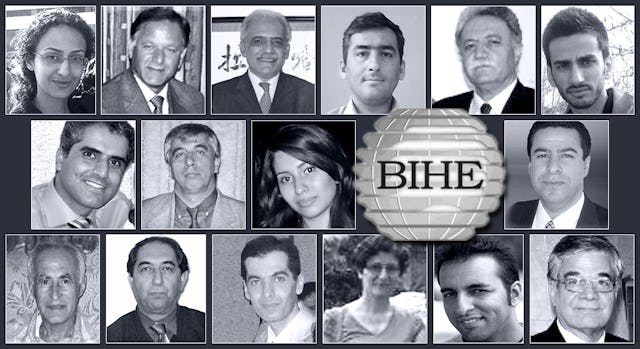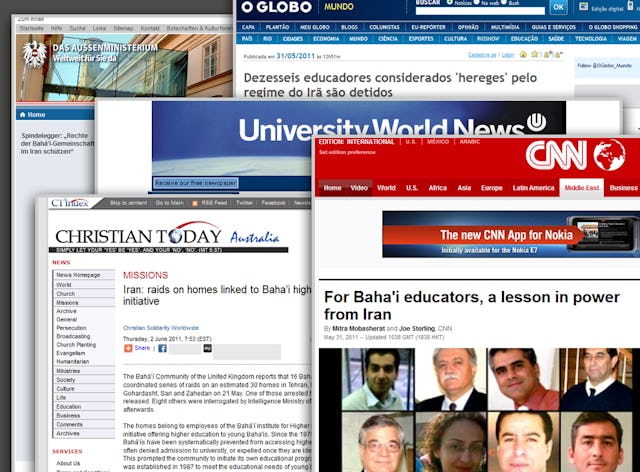Worldwide outrage at Iran's attack on Baha'i educators
GENEVA, Switzerland — Governments, organisations and educators have condemned Iran's latest attack on an initiative offering higher education to young Baha'is barred from university.
The government of Austria, more than 80 prominent Indians, and top academics from the United Kingdom, are among the latest to voice their support for Iranian Baha'is' right to education. Human rights groups have also joined the call for the release of imprisoned Baha'i educators.
Some 39 homes associated with the Baha'i Institute for Higher Education (BIHE) have recently been targeted. Twelve BIHE staff and faculty members remain in prison, three weeks after initial raids. Five others were also arrested and subsequently released, while more Baha'is associated with the Institute were summoned for interrogation by the Ministry of Intelligence.
"The latest house searches and arrests demonstrate a further effort in order to block access to education for the Baha'i community," said Michael Spindelegger, Austria's Vice Chancellor and Foreign Minister.
"The right to education is a fundamental human right for everyone, independent of his or her religion. The restriction of access to education for young Baha'is is unacceptable."
"To persecute people because of their Faith is a clear violation against human rights. Iran must observe its international obligations," Dr. Spindelegger said, on 1 June.
Iran's Ministry of Science and Technology has now reportedly declared all BIHE activities to be illegal.
"Barring Baha'is from university exposes the government's own ignorance," a group of leading academics in England wrote in an open letter, published in The Guardian on 11 June.
"Young Baha'is who cannot study are denied a basic human right," the letter said. "Their desire to contribute to society is being strangled at the start of their adult lives."
"Academics, students and politicians should join common cause for Baha'i students in Iran. The authorities must be taught that human rights are universal," wrote the signatories, who included professors from Oxford, Cambridge and other prestigious universities.
In India, more than 80 prominent citizens – representing the judiciary, academics, religious leadership, NGOs, human rights groups and the corporate sector – have signed a petition to the Iranian Government calling for the immediate and unconditional release of the BIHE prisoners.
"The recent atrocities heaped upon this persecuted community...deserves the strongest condemnation from every upholder of human dignity and honour in India and the world," says the petition, whose signatories include Justice V. R. Krishna Iyer, a former judge of India's Supreme Court, and Miloon Kothari, a former UN Special Rapporteur on adequate housing.
"The consequences of this policy of disallowing the Baha'i youth to have access to higher education will be detrimental not only for the Baha'i community of Iran, but also for the nation as a whole."
Christian Solidarity Worldwide (CSW) is also urging Iran to end its discriminatory educational policies. "Despite being a signatory to the International Covenant on Civil and Political Rights (ICCPR), by which countries pledge to uphold international standards of religious freedom for all citizens, Iran is clearly targeting both the Baha'is and certain Christian communities solely on account of their beliefs," said CSW's chief executive, Mervyn Thomas.
"CSW calls on the Iranian government to honour its commitments under the ICCPR and ensure that religious minorities are able to enjoy the freedoms outlined within the covenant."
In the United States, Senator Mark Kirk – who earlier this year introduced a bipartisan Senate resolution criticizing Iran's persecution of Baha'is – said the international community must "strongly condemn" the latest arrests. "I pledge to redouble our efforts in the Senate on behalf of the Iranian Baha'i community and all citizens of Iran who yearn for human rights, freedom and democracy," said Senator Kirk.
A seminar – held at the University of California, Berkeley, on 22 April – highlighted the issue of human rights abuses in Iran, including the barring of Baha'is and others from higher education. The audience of academic staff, students and guests included Brazilians, Anglo-Americans, Nicaraguans, Salvadorians, and Afghanis.
Firuzeh Mahmoudi, co-founder and executive director of United4Iran, spoke of the courage of a number of recently imprisoned students in Iran.
The Iranian government has breached its international human rights obligations in many ways, said Ms. Mahmoudi, including "freedom of expression, freedom of association, belief, religion, privacy, right to participation in public forums, gatherings and protests; freedom from arbitrary arrest and detention; right to due process and fair trials; freedom from torture; from movement – that means being able to leave Iran, right to membership and participation."
The International Campaign for Human Rights in Iran and the U.S. Commission on International Religious Freedom have also demanded the release of the prisoners. See https://news.bahai.org/story/827.
Among the articles about the attack on the BIHE in the world's media, reports have appeared in Brazil's O Globo newspaper, The Washington Post and on Australia's ABC radio, as well as on the websites of CNN International, University World News, Radio Free Europe, and The Huffington Post.
The situation of the Baha'is in Iran will further be highlighted on Wednesday 15 June at a seminar to be held in the United Kingdom's Houses of Parliament, and on Sunday 19 June at a major event organized by Rio's Commission for Combating Religious Intolerance, in Rio de Janeiro, Brazil.
(Article updated 16 June 2011. The original caption for the lead photograph reported the release of only one of the detainees.)
Special Report
The Baha'i World News Service has published a Special Report which includes articles and background information about Iran's campaign to deny higher education to Baha'is. The Special Report contains a summary of the situation, feature articles, case studies and testimonials from students, resources and links.
The International Reaction page of the Baha'i World News service is regularly updated with responses from governments, nongovernmental organizations, and prominent individuals, to actions taken against the Baha'is of Iran.
The Media Reports page presents a digest of media coverage from around the world.

